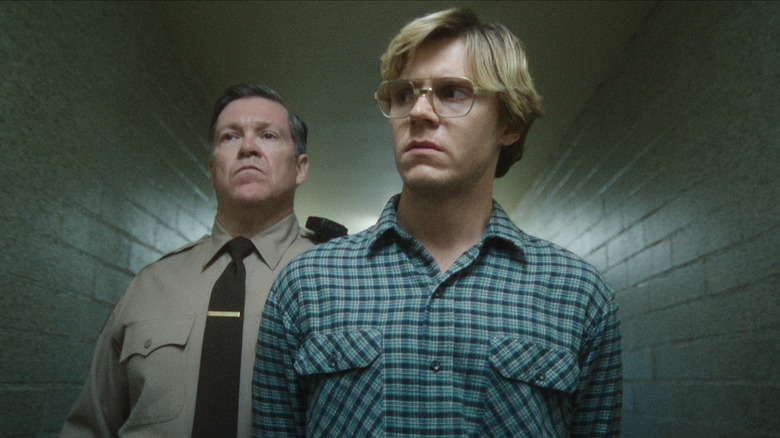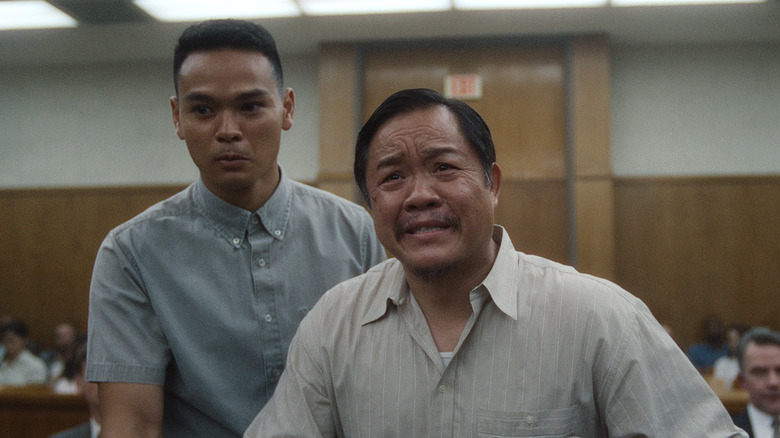
The blood was in the water for Netflix's "Dahmer" well before the series hit the streaming platform on September 21, 2022. The awkward full title aside ("DAHMER - Monster: The Jeffrey Dahmer Story"), the series should have been Netflix gold: it combined the streamer's knack for dramatic true-crime storytelling with the star power of Evan Peters and Ryan Murphy (Peters played the lead role, Murphy — who created hits like "Glee" and "American Crime Story" — co-created and produced). Certainly, there's been no shortage of content about or inspired by serial-killers in recent years, especially on Netflix.
So why did "Dahmer" drop with such a quietly squishy plop?
"Dahmer" did not received the traditional Netflix treatment, which is never a good sign. As Stuart Heritage notes in The Guardian, the lack of marketing and manufactured buzz for the series screams of low-faith from the streamer:
"Dahmer" just arrived. There was no premiere. No media were granted preview access, none of the show's stars were made available for interview. Unless you caught the perfunctory trailer that slid out online five days before the show's release, you would be forgiven for not knowing it existed at all.
The show's ratings are, so far, mixed, with audiences apparently being more receptive to the show than critics. Heritage describes "Dahmer" as "an almost unwatchably queasy show," noting that rather than focus on the victims or the impact, "Dahmer is undoubtedly fetishised" in the series, which "is unfortunately too infatuated with its star attraction." But among the show's biggest critics are the real-life family members of Dahmer's victims, some of whom are actually depicted in the show — and the experience, far from feeling cathartic, is forcing them to relive the worst moments of their lives.
'It's Cruel'

Following the show's premiere, Eric Perry, cousin of Jeffrey Dahmer victim Errol Lindsey, took to social media to voice his disgust with Netflix and the creative choices in "Dahmer." In a quote tweet that compares a scene from the Netflix series to the real courtroom footage from Dahmer's trial, Perry condemned the show, arguing "it's retraumatizing over and over again, and for what? How many movies/shows/documentaries do we need?"
I’m not telling anyone what to watch, I know true crime media is huge rn, but if you’re actually curious about the victims, my family (the Isbell’s) are pissed about this show. It’s retraumatizing over and over again, and for what? How many movies/shows/documentaries do we need? https://t.co/CRQjXWAvjx
— eric. (@ericthulhu) September 22, 2022
Perry further pointed to the lack of sensitivity toward the living, many of whom are depicted in the series — without their knowledge, let alone consent. As he explains, because the information is all public record, there was no obligation or requirement for Ryan Murphy Productions to contact those involved in the story, so his "family found out when everyone else did." Using actual trauma for the sake of entertainment can easily cross the line into exploitation; as Perry states in a tweet, "Recreating my cousin having an emotional breakdown in court in the face of the man who tortured and murdered her brother is WILD."
I can only imagine how violated and disgusted I would feel if I was Rita Isbell, seeing an actor dressed like me recreating such an intensely personal, devastating moment. The purpose of these courtroom testimonies is to find justice, not to entertain. It's frankly disappointing that, in 2022, we're still so callously fascinated with figures like Jeffrey Dahmer.
According to IndieWire, the official word from "Dahmer" is that this wasn't the intention:
The show's production team has defended the project, saying that the goal was never to humanize Dahmer but instead to show the perspectives of the victims and explain the ways that race and sexuality informed the killings.
Ryan Murphy's Legacy

To be fair — and blunt — Murphy has proven his inability to balance good taste and horror thrills over and over again. It's one thing for him to executive produce a true crime series that focuses on well-known and culturally significant court cases, and quite another for him to be given the reins on a project like "Dahmer." Murphy has had fun with real-life serial killers before: just look at "American Horror Story" to find countless examples. And no one has walked away from watching that series feeling like the content was handled with nuance and sensitivity. It's a show that's essentially made ostentatious brutality its defining feature.
Technically, Murphy has even adapted Dahmer's story before in "American Horror Story" (also the show that capitulated Evan Peters into stardom). In "AHS: Hotel," Seth Gabel played Dahmer for the "Devil's Night" episode, which featured notorious real-life serial killers like John Wayne Gacy and Richard Ramirez (aka the Night Stalker — there is also a Netflix series about him).
I don't want to belabor the point here, but basically: there's a fine line between taking inspiration from a tragic event, and exploiting horrific (and relatively recent) history inappropriately. Despite the claims of wanting to highlight systemic racism or wanting to humanize Dahmer's real-life victims, the "Monster" series spends five hours painting an intimate portrait of its titular subject before shifting focus to those affected by his actions. It's questionable if Murphy already crossed that line with "AHS," but he definitely does with "DAHMER - Monster: The Jeffrey Dahmer Story."
Read this next: The 18 Best Crime Dramas In TV History
The post Relative Of Jeffrey Dahmer Victim Says Netflix's Monster Is 'Retraumatizing' Their Family appeared first on /Film.
0 Comments